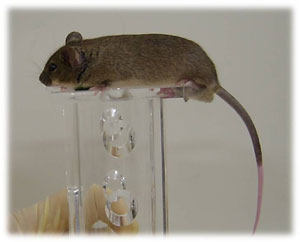HOME > mice > SCG/ThpNkc mice
Strain Detail: SCG/ThpNkc mice
| Strain information | |
|---|---|
| Resource No. | nbio133 |
| Strain name | SCG/ThpNkc |
| Strain Nomenclature | |
| Common name/Synonyms | SCG/Kj mice |
| Strain types | inbred |
| Background strain | |
| Institution | Tohoku University |
| Developer | Koken Kinjoh (Tohoku University) |
| Depositor | Akira Masuda (NIPPON KAYAKU Co., Ltd.) |
| Conditions of distribution | In publishing the research results obtained by use of the biological resource, a citation of the following literature (ref. 1) designated by the depositor is requested. The recipient must contact the depositor in the case of application for any publications, patents or commercial use with the results from the use of the biological resource. :contact us |
| Animal Health Report | |
| Strain description |  The SCG/Kj mouse strain, a.k.a. SCG/ThpNkc, is an inbred strain known as a mouse model for rapidly progressive glomerulonephritis. The strain was established by sib mating of mice produced by mating between a BXSB/MpJ (BXSB) female to an MRL/MpJ-lpr/lpr (MRL/lpr) male. SCG/Kj mice develop crescentic glomerulonephritis and ANCA-associated vasculitis, which are not observed in BXSB and MRL/lpr, and die earlier than BXSB and MRL/lpr. These differences may be due to the presence of the autoimmune-promoting gene lpr (Faslpr) derived from MRL/MpJ-lpr/lpr, as well as the genetic background of BXSB/MpJ. Method of strain maintenanceMating should begin at 6 weeks of age because some females of the SCG/Kj strain develop glomerulonephritis and vasculitis at approximately 8 weeks of age. To maintain the incidence of the disease, we routinely test the parents' urine for protein and blood (e.g., urine test sticks, Eiken Chemical Co., Tokyo, Japan) after weaning of the pups, and among the urine symptom-positive females, we identify the females with both renal crescent formation and vasculitis development and then select pups derived from the symptomatic females for the next generation. |
| Reference(s) |
|
| Resource information | |||
|---|---|---|---|
| Cryopreserved sperm | In-house | Genotype | |
| Medium | FERTIUP | ||
| From other institutions | Genotype | ||
| Medium | |||
| Cryopreserved embryo | In-house | Mating System | |
| Genotype | |||
| Medium | EFS40 | ||
| From other institutions | Mating System | ||
| Genotype | |||
| Method | |||
| Strain status / Availability | Cryopreserved sperm | Within 1 month | |
| Cryopreserved embryo | Within 1 month | ||
| Live animals | Approx. 2 months | ||
| Gene information | |
|---|---|
| Mutation types | spontaneus mutation |
| Gene symbol | Faslpr |
| Gene name | Fas (TNF receptor superfamily member 6) |
| Genotyping information | |
